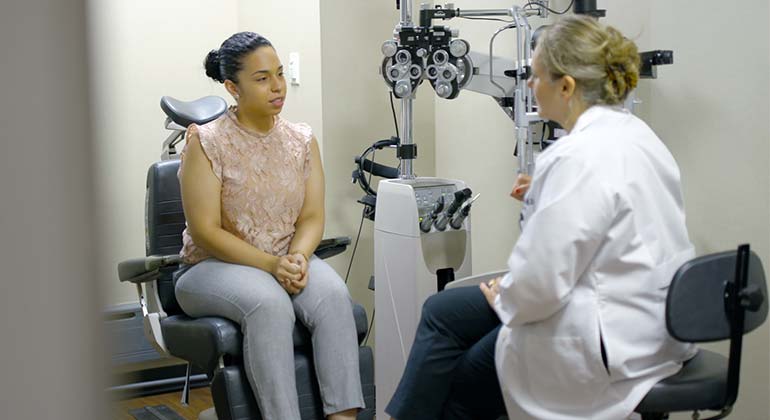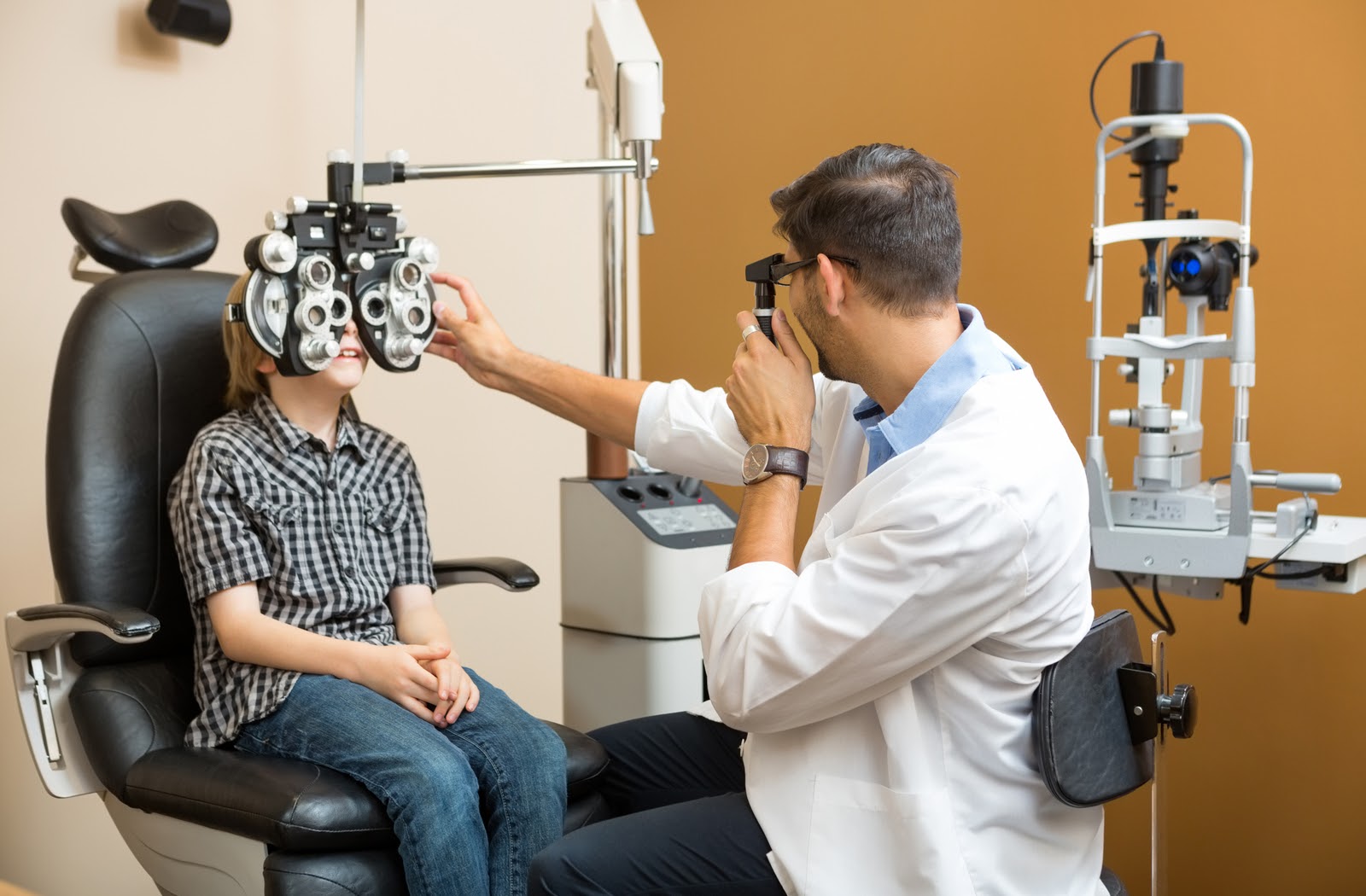Locate an Optometrist Near Me for Your Eye Health
Wiki Article
The Significance of Routine Eye Exams: Insights From a Skilled Optometrist
Routine eye examinations serve as an important element of health care that extends beyond plain vision correction. An experienced ophthalmologist can give understandings right into exactly how these assessments not only detect common eye conditions but also disclose underlying wellness problems that may otherwise go unnoticed. The silent development of diseases such as glaucoma and macular deterioration highlights the requirement of early detection. Understanding the frequency and value of these analyses can inevitably affect one's long-term health trajectory, elevating the inquiry of just how often individuals need to prioritize their eye wellness in the context of overall health.Advantages of Regular Eye Exams
Although many people may overlook the importance of regular eye examinations, these assessments play a vital function in maintaining total wellness and wellness. Routine eye evaluations offer not just to evaluate vision but likewise to spot very early indications of systemic health and wellness concerns, including diabetic issues and hypertension. By determining these problems at their creation, individuals can get timely interventions, significantly boosting long-lasting outcomes.Furthermore, eye exams can help in keeping an eye on existing wellness problems, ensuring that any type of modifications in vision or eye health and wellness are immediately resolved (optometrist). The analyses enable customized recommendations concerning eyeglasses, way of life modifications, and safety actions versus possible eye pressure or damages
Beyond physical wellness, the advantages of normal eye tests include enhancing lifestyle. Enhanced vision promotes far better efficiency in day-to-day tasks, from reading to driving, thereby adding to greater independence and security. Inevitably, focusing on eye tests cultivates an aggressive approach to health and wellness monitoring, empowering individuals to take charge of their wellness. Routine exams are a necessary part of an extensive healthcare strategy, guaranteeing that both vision and general health and wellness are maintained throughout life.
Common Eye Conditions Detected
Regular eye tests are instrumental in finding a range of usual eye problems that can significantly impact vision and general health and wellness. Among the most common conditions determined throughout these examinations are refractive mistakes, including myopia (nearsightedness), hyperopia (farsightedness), and astigmatism. These conditions often manifest as obscured vision and can be conveniently fixed with prescription glasses or call lenses.
One more common issue is glaucoma, a group of eye conditions that damage the optic nerve, often connected to increased intraocular stress. Early detection is critical as it can avoid irreparable vision loss.
Age-related macular deterioration (AMD) is one more substantial condition that influences central vision, particularly in individuals over 50. Ultimately, diabetic retinopathy, a difficulty of diabetes mellitus, can result in serious vision problems if not monitored frequently. Through extensive eye examinations, these problems can be determined early, allowing for timely administration and therapy to preserve vision and improve lifestyle.
Significance of Early Detection
Early discovery of eye problems plays a crucial function in protecting vision and stopping considerable health complications. Several eye illness, such as glaucoma, diabetic retinopathy, and age-related macular degeneration, can progress calmly without obvious signs in their early phases. By the time signs manifest, irreparable damage may have taken place, bring about long-term vision loss.
Routine eye exams facilitate very early diagnosis, permitting prompt treatment and treatment. For instance, dealing with raised intraocular pressure can protect against the start of glaucoma, while handling blood glucose levels can considerably decrease the risk of diabetic person retinopathy. Furthermore, conditions like cataracts can be effectively managed with medical intervention when see here recognized early.

Just How Frequently Should You See?
Figuring out the regularity of eye exams is essential for preserving ideal eye health and vision. The general suggestion for grownups is to have a comprehensive eye test every one to 2 years, depending on specific threat factors and age.Individuals with details risk elements, such as a household background of eye illness, diabetes mellitus, or existing vision problems, may require more frequent examinations. Kids must have their very first eye test at 6 months old, adhered to by added examinations at age 3 and prior to entering school. Regular check-ups throughout youth are important as vision can transform rapidly during developmental years.
Inevitably, the regularity of sees need to be customized per person's conditions, including way of life, job-related dangers, and any kind of pre-existing eye conditions. Consulting with an eye treatment professional can give individualized suggestions, guaranteeing that your eye health and wellness is frequently monitored and maintained.
Tips for Your Eye Exam
Preparing for your eye exam can enhance the performance of the visit and ensure an extensive assessment of your eye wellness. To maximize your time with the eye physician, it is vital to collect pertinent information prior to your visit. Beginning by compiling a listing of any kind of drugs you are currently taking, including non-prescription drugs and supplements, as these can affect eye health and wellness.Additionally, document any type of signs you have actually experienced, such as obscured vision, discomfort, or migraines. This details will certainly help your ophthalmologist in diagnosing prospective issues. If you put on glasses or contact lenses, bring them along, also if you don't wear them on a regular basis. This will assist the medical professional assess any kind of adjustments in your like this vision.
It is also useful to have a family members history of eye conditions handy, as hereditary factors can add to your eye health and wellness. Ultimately, take into consideration scheduling your exam for a time when view it you are less hurried, permitting you to ask concerns and discuss your problems extensively. By preparing adequately, you make certain that your eye exam is productive which your optometrist has all the necessary info to supply the very best treatment possible.

Final Thought
Regular eye examinations play an essential duty in preserving both vision and total health. They assist in the very early discovery of different eye conditions and systemic problems, permitting timely treatment. The suggestions for regularity highlight the value of proactive treatment. Carrying out straightforward preparatory suggestions can improve the exam experience. Eventually, focusing on extensive eye assessments adds considerably to the conservation of vision and the renovation of lifestyle, highlighting the necessity of routine eye care in precautionary medical care approaches.Routine eye tests are critical in detecting a range of usual eye conditions that can dramatically impact vision and general health and wellness.Establishing the regularity of eye examinations is important for maintaining ideal eye health and wellness and vision.Preparing for your eye examination can improve the efficiency of the check out and make sure an extensive evaluation of your eye health (optometrist). By preparing effectively, you make certain that your eye examination is productive and that your eye medical professional has all the necessary info to offer the ideal treatment feasible
Ultimately, prioritizing comprehensive eye analyses contributes substantially to the conservation of vision and the enhancement of quality of life, underscoring the requirement of routine eye care in preventative health care methods.
Report this wiki page